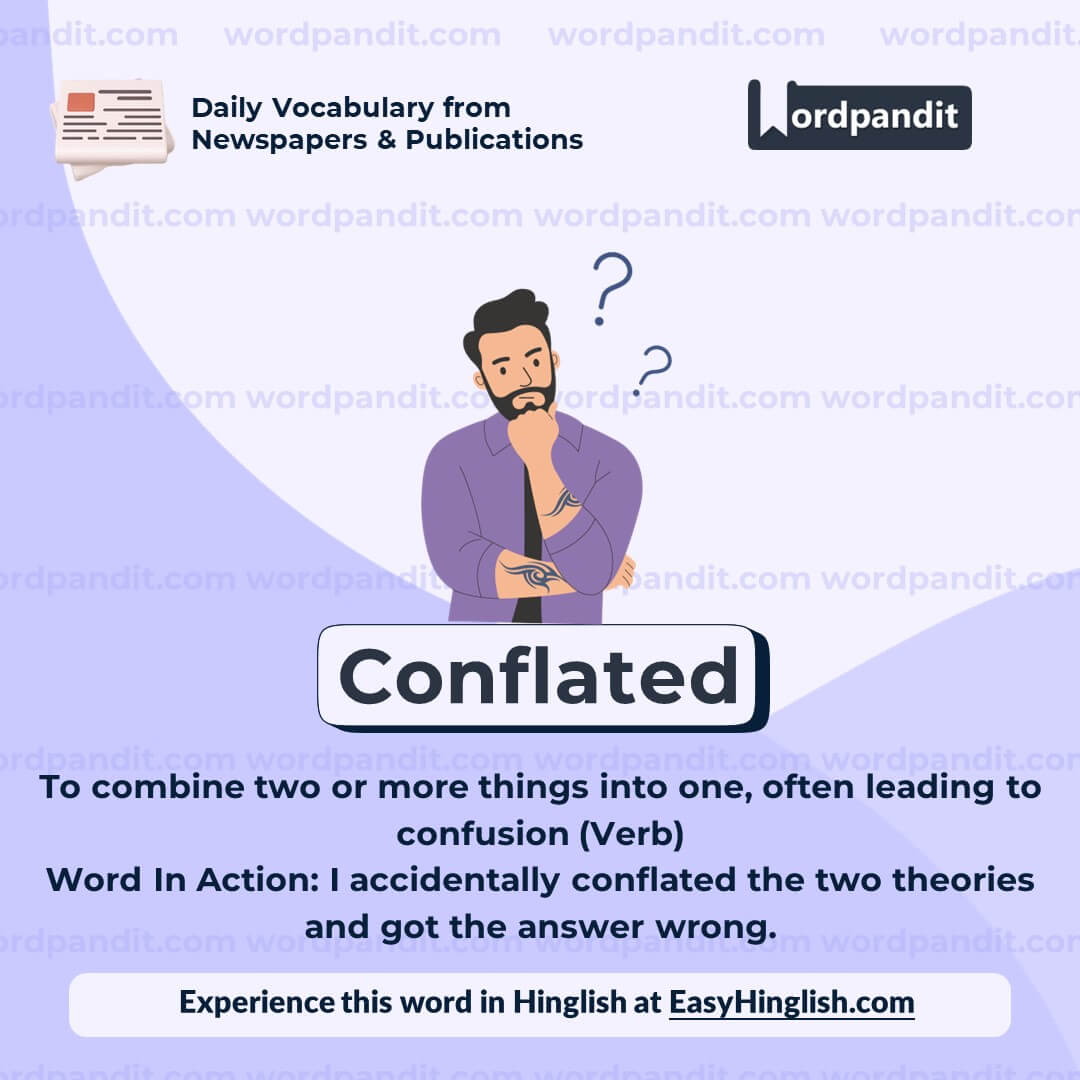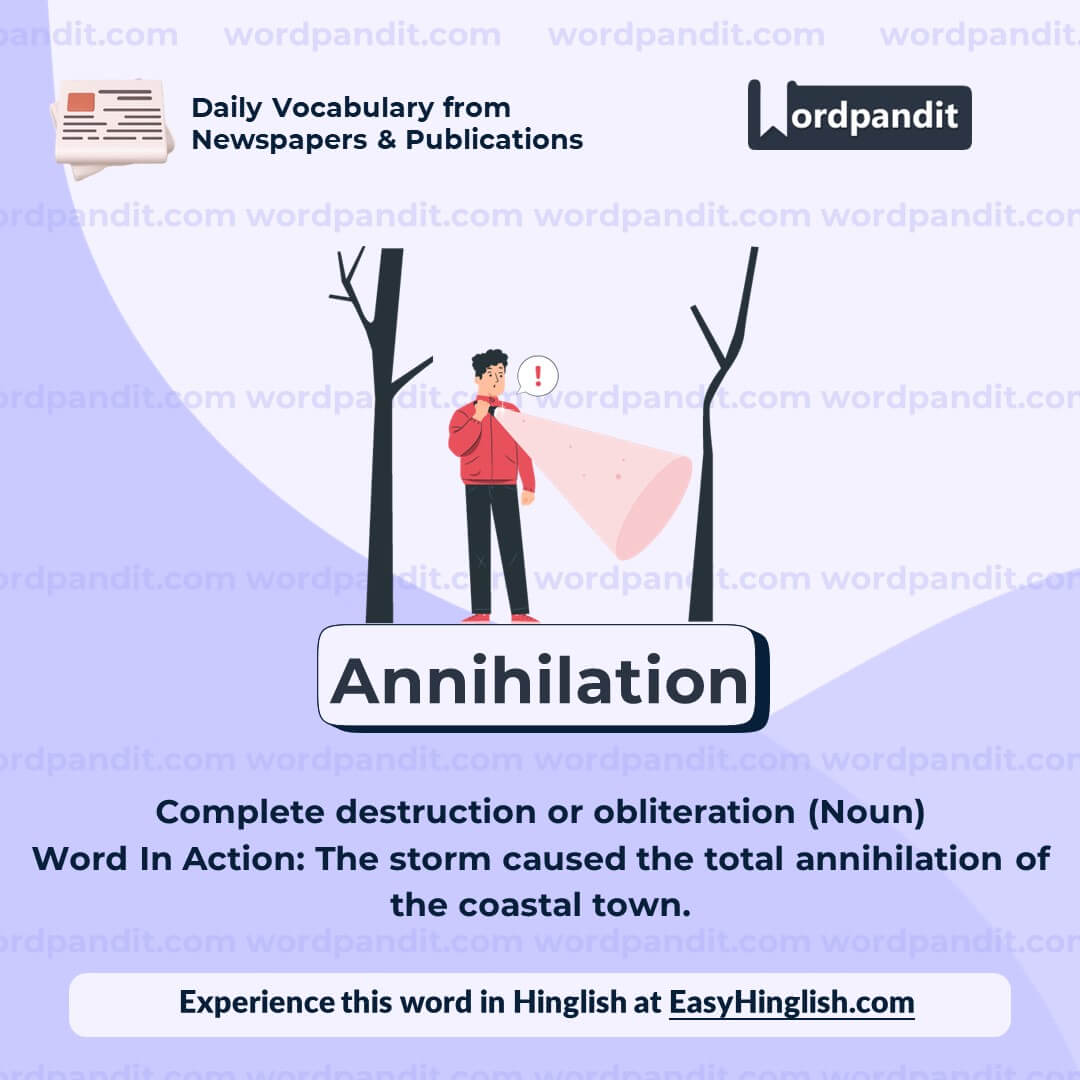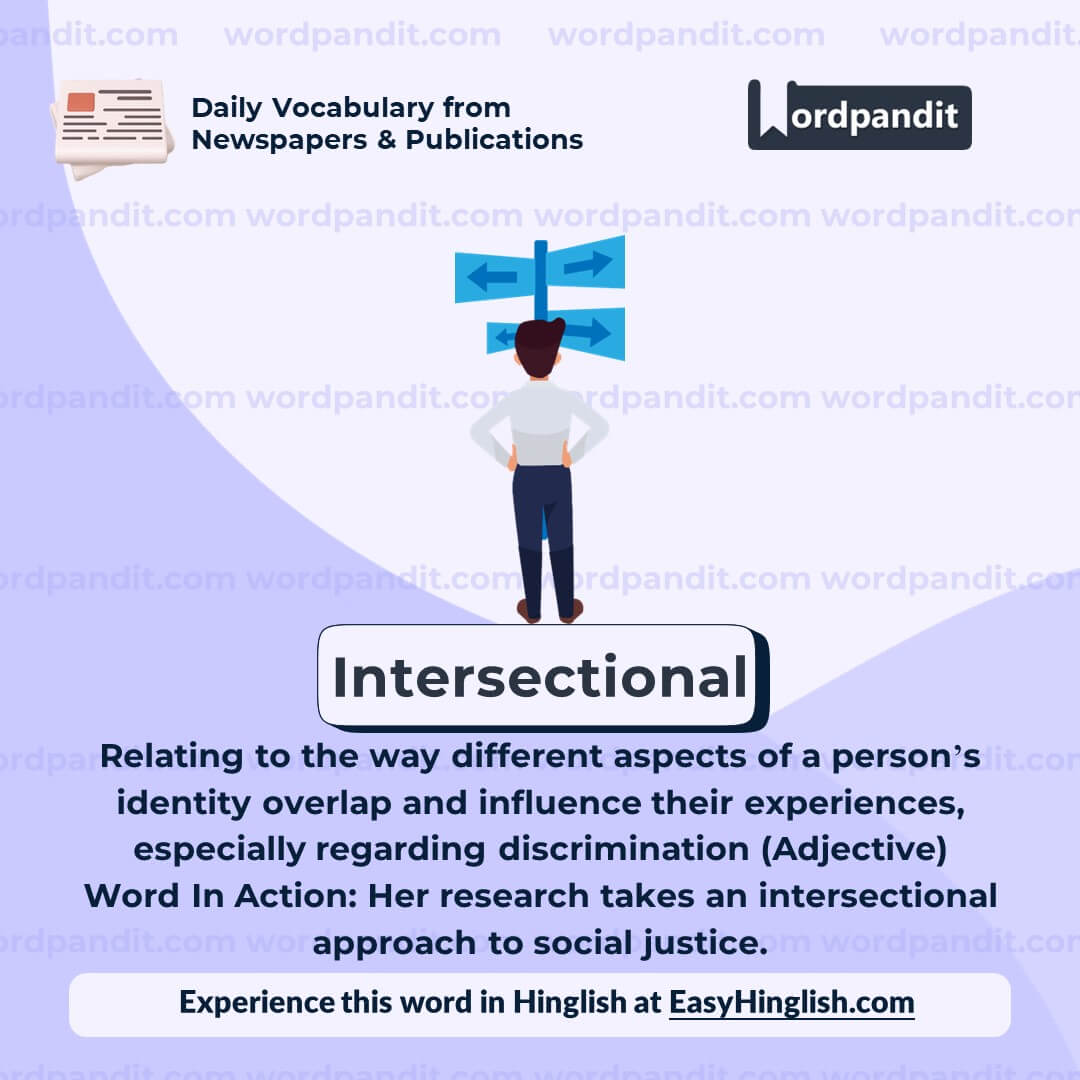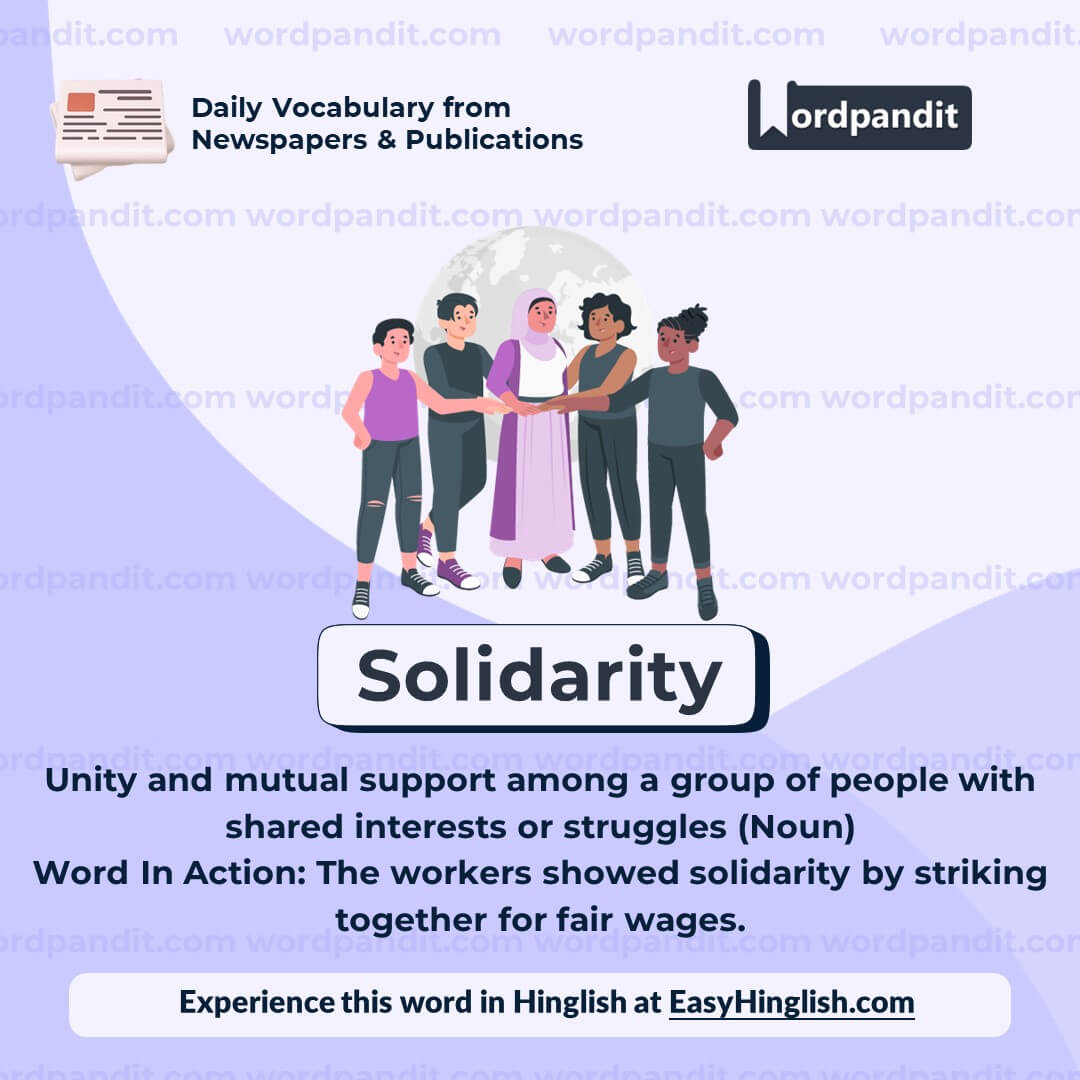Daily Vocabulary from Indian Newspapers and Publications
Welcome to Wordpandit’s Indian Vocabulary Hub
At Wordpandit, we understand the importance of staying rooted in the local context while expanding your language skills. This section focuses on enriching your vocabulary with words and phrases drawn from India’s leading newspapers and publications, ensuring you're learning vocabulary that is practical, relevant, and uniquely Indian.
Why Indian Sources Matter
We believe that the best way to master any language is by immersing yourself in local content. That’s why we carefully curate vocabulary from top Indian publications, including:
- The Hindu
- The Times of India
- The Economic Times
- Hindustan Times
- Live Mint
- The Indian Express
- And many others...
Stay Updated, Stay Relevant
With daily updates from Indian news sources, you’ll be consistently learning words that reflect the trends and shifts in Indian society and culture. Our focus is to provide vocabulary that enhances your understanding of the language in an Indian context.
How Wordpandit Supports Your Goals
Whether you’re preparing for exams, aiming to improve your professional communication, or simply want to stay connected with the latest Indian vocabulary, Wordpandit is here to guide you every step of the way.
Learn with a Practical Approach
Our interactive learning methodology includes real-world examples, engaging activities, and context-specific usage to ensure that every word becomes part of your active vocabulary.
Dive into Indian Vocabulary Today!
Why Choose Wordpandit?
Practical Learning: Focus on words you'll actually encounter in real-world reading, enhancing your comprehension and communication skills.
Diverse Content: From current affairs to scientific breakthroughs, our varied sources expose you to vocabulary across multiple domains.
Effortless Integration: Make Wordpandit a part of your daily routine. Just a few minutes each day can significantly boost your lexicon over time.
Your Path to Vocabulary Mastery
- Visit our Daily Vocabulary section regularly
- Explore new words and their usage in context
- Practice incorporating these words into your own writing and speech
- Track your progress as your vocabulary expands
Start Your Journey Today
Embark on your vocabulary enhancement journey with Wordpandit. By consistently engaging with our daily posts, you'll build a robust vocabulary that serves you well in academic, professional, and personal contexts.
Remember, a word a day keeps linguistic limitations at bay. Make Wordpandit your daily companion in the quest for vocabulary excellence!
WORD-1: Conflated
Context:
"Muslim and Arab identities have long been conflated, particularly by those who seek to villainize both, making anti-Muslim hate part and parcel of anti-Arab, and specifically, anti-Palestinian racism." - The Wire
Explanatory Paragraph:
The word "conflated" means to combine or mix different ideas, concepts, or entities—often incorrectly or misleadingly. In the context provided, it refers to the frequent mistaken merging of Muslim and Arab identities, despite the fact that not all Arabs are Muslim, and not all Muslims are Arab. This kind of conflation can lead to misunderstandings and reinforce harmful stereotypes.
Meaning: To combine two or more things into one, often leading to confusion (Verb)
Pronunciation: kuhn-FLAY-ted
Difficulty Level: ⭐⭐⭐ Intermediate
Etymology: Derived from the Latin word conflare, meaning "to blow together" or "fuse."
Synonyms & Antonyms:
Synonyms: Merge, blend, fuse, mix, amalgamate
Antonyms: Separate, distinguish, differentiate
Usage Examples:
- The historian warned against conflating myths with actual historical events.
- In many debates, economic struggles and political failures are often conflated, leading to misdiagnosed solutions.
- She mistakenly conflated his kindness with romantic interest.
- The media sometimes conflates different cultural practices, creating a misleading narrative.
Cultural Reference:
"Conflating wealth with happiness is a common mistake in modern society." - A popular critique in psychological studies.
Think About It:
How does conflating different ideas or identities affect public perception and decision-making in society?
Quick Activity:
Identify three common examples where people conflate two distinct concepts. Write a brief explanation of why they are actually different.
Memory Tip:
Think of "conflated" as "confusedly inflated"—when two separate things are blown up into one, often causing misunderstandings.
Real-World Application:
Understanding conflation is essential in critical thinking. It helps distinguish between facts and assumptions, particularly in news, politics, and academic writing.
WORD-2: Annihilation
Context:
"It would not have been the lesser evil had they been the ones facing annihilation." - The Wire
Explanatory Paragraph:
"Annihilation" refers to the complete destruction or obliteration of something. It is often used in contexts involving war, conflict, and extreme devastation. The word carries a strong connotation of absolute erasure, leaving no trace behind. In the given sentence, "annihilation" implies a catastrophic fate, emphasizing the severity of what is being discussed.
Meaning: Complete destruction or obliteration (Noun)
Pronunciation: uh-NY-uh-lay-shun
Difficulty Level: ⭐⭐⭐⭐ Advanced
Etymology: From the Latin word annihilare, meaning "to reduce to nothing," derived from ad ("to") and nihil ("nothing").
Synonyms & Antonyms:
Synonyms: Destruction, obliteration, extermination, eradication, devastation
Antonyms: Preservation, survival, protection, conservation
Usage Examples:
- The nuclear explosion led to the annihilation of an entire city.
- The invading army sought the total annihilation of their enemies.
- Without urgent action, climate change could result in the annihilation of many ecosystems.
- The superhero prevented the annihilation of the planet by defusing the deadly bomb.
Cultural Reference:
"Annihilation" is the title of a famous sci-fi novel by Jeff VanderMeer, which explores the mysterious and eerie transformation of an unknown region.
Think About It:
Can the annihilation of an idea or ideology be as impactful as the annihilation of a physical place?
Quick Activity:
Think of a historical event where annihilation played a significant role. Write a short paragraph describing its impact.
Memory Tip:
Remember that "annihilation" sounds like "a-nothing-lation"—it means reducing something to nothing.
Real-World Application:
The concept of annihilation is relevant in discussions about war, environmental destruction, and even scientific fields like particle physics, where matter and antimatter can annihilate each other.
WORD-3: Egregious
Context:
"The exclusion and minimising of Islamophobia as an egregious form of racism enables Muslims to be acceptably silenced and removed." - The Wire
Explanatory Paragraph:
The word "egregious" is used to describe something that is shockingly bad or outrageously offensive. It often refers to errors, injustices, or acts that are so blatant and severe that they cannot be ignored. In the given context, it highlights how Islamophobia is an especially severe and obvious form of racism that is unjustly minimized or overlooked.
Meaning: Outstandingly bad; shocking (Adjective)
Pronunciation: ih-GREE-jus
Difficulty Level: ⭐⭐⭐⭐ Advanced
Etymology: From the Latin word egregius, meaning "distinguished" or "standing out," which later evolved to mean something outstanding in a negative sense.
Synonyms & Antonyms:
Synonyms: Outrageous, shocking, blatant, atrocious, flagrant
Antonyms: Minor, insignificant, subtle, acceptable
Usage Examples:
- The politician's egregious lies shocked the entire nation.
- The company's egregious violation of labor laws led to heavy fines.
- Ignoring climate change despite overwhelming evidence is an egregious mistake.
- The referee's egregious error cost the team their victory.
Cultural Reference:
"Egregious" is frequently used in legal and ethical discussions, particularly when referring to human rights violations and corruption cases.
Think About It:
What are some egregious injustices in history that were initially ignored but later recognized as major issues?
Quick Activity:
Write a short paragraph describing an egregious act you have read about in the news. Explain why it was considered so shocking.
Memory Tip:
Think of "egregious" as "extra-grievous"—something so bad that it stands out.
Real-World Application:
"Egregious" is commonly used in news reports, legal cases, and social justice discussions to highlight severe wrongdoing.
WORD-4: Intersectional
Context:
"Too, every Muslim inhabits multiple intersectional identities. My gender, brownness, faith, art, the languages I shape, country of birth, immigrant status, all, are rivers in a kaleidoscopic sea." - The Wire
Explanatory Paragraph:
"Intersectional" refers to the way different aspects of a person’s identity—such as race, gender, class, religion, and more—overlap and interact to shape their experiences, especially in relation to discrimination or privilege. The concept comes from intersectionality, a term coined by legal scholar Kimberlé Crenshaw to explain how multiple social identities can combine to create unique forms of oppression. In the given context, the writer describes how various aspects of their identity merge to form a complex and multifaceted existence.
Meaning: Relating to the way different aspects of a person’s identity overlap and influence their experiences, especially regarding discrimination (Adjective)
Pronunciation: in-ter-SEK-shuh-nul
Difficulty Level: ⭐⭐⭐⭐ Advanced
Etymology: Derived from "intersection," meaning a crossing or meeting point, combined with the suffix "-al" to form an adjective. Popularized in the late 20th century by legal scholar Kimberlé Crenshaw.
Synonyms & Antonyms:
Synonyms: Overlapping, interconnected, multidimensional
Antonyms: Isolated, separate, singular
Usage Examples:
- The activist emphasized the importance of an intersectional approach to feminism, considering race, class, and disability alongside gender.
- Her research explores how intersectional identities shape workplace discrimination.
- Understanding intersectional struggles helps create more inclusive policies.
- The film portrays the intersectional challenges faced by immigrants of color.
Cultural Reference:
"Intersectionality" was first coined by Kimberlé Crenshaw in 1989 to describe how different forms of discrimination can overlap, particularly in the experiences of Black women.
Think About It:
How do intersectional identities influence the way people experience privilege and discrimination differently?
Quick Activity:
Think about your own identity. List at least three different aspects (e.g., gender, ethnicity, socioeconomic background) and reflect on how they intersect to shape your experiences.
Memory Tip:
Think of an "intersection" on a road—where multiple streets meet. Similarly, "intersectional" means multiple identities intersecting.
Real-World Application:
The concept of intersectionality is widely used in social justice movements, legal studies, and diversity training to ensure that policies and discussions account for multiple overlapping identities.
WORD-5: Solidarity
Context:
"My local and Indigenous students were willing to draw connections across anti-colonial and Indigenous solidarity movements." - The Wire
Explanatory Paragraph:
"Solidarity" refers to unity or mutual support within a group, often in pursuit of a common goal, especially in social or political movements. It signifies a deep sense of shared purpose, empathy, and collective action. In the given context, the word emphasizes how local and Indigenous students are recognizing and supporting struggles beyond their own, building alliances across anti-colonial and Indigenous movements.
Meaning: Unity and mutual support among a group of people with shared interests or struggles (Noun)
Pronunciation: sol-ih-DAR-ih-tee
Difficulty Level: ⭐⭐⭐ Intermediate
Etymology: From the Latin word solidus, meaning "whole" or "firm," and the French word solidarité, meaning "interdependence."
Synonyms & Antonyms:
Synonyms: Unity, camaraderie, alliance, support, cooperation
Antonyms: Division, discord, isolation, disunity
Usage Examples:
- Workers across different industries showed solidarity by joining the nationwide strike.
- The global protest was a powerful act of solidarity against racial injustice.
- Students expressed solidarity with refugees by organizing donation drives.
- Her solidarity with marginalized communities made her a respected activist.
Cultural Reference:
The Polish labor movement "Solidarity" (Solidarność) in the 1980s played a major role in opposing communist rule, showing how unity and resistance can bring political change.
Think About It:
Why is solidarity important in both social movements and everyday life? Can you think of an example where solidarity made a real difference?
Quick Activity:
List three social or political movements where solidarity played a key role. Briefly describe how people united to achieve change.
Memory Tip:
Think of "solidarity" as a "solid group"—people standing together as one strong unit.
Real-World Application:
Solidarity is crucial in workplaces, activism, and international relations, fostering support among people fighting for justice, equality, and human rights.



















